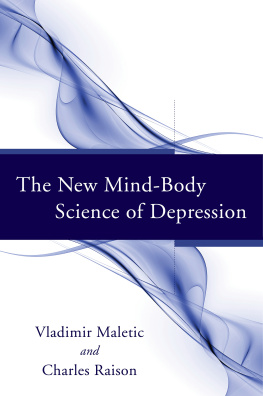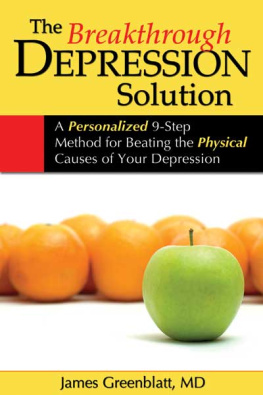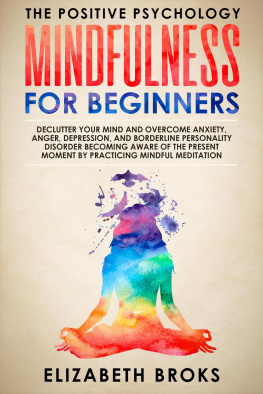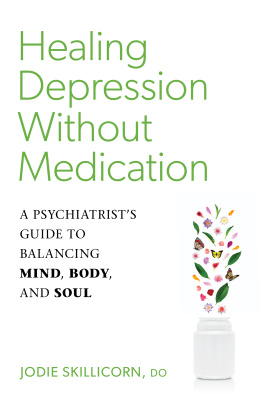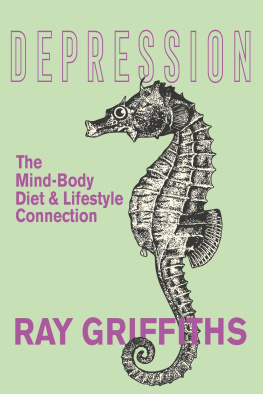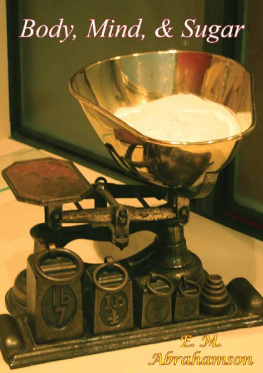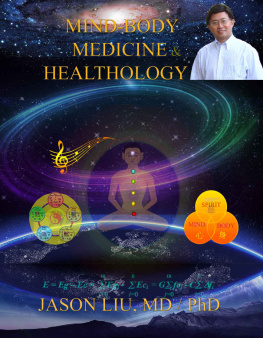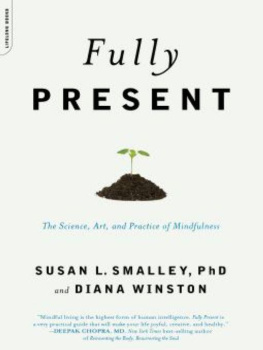Vladimir Maletic - The New Mind-Body Science of Depression
Here you can read online Vladimir Maletic - The New Mind-Body Science of Depression full text of the book (entire story) in english for free. Download pdf and epub, get meaning, cover and reviews about this ebook. year: 2017, publisher: W. W. Norton Company, genre: Romance novel. Description of the work, (preface) as well as reviews are available. Best literature library LitArk.com created for fans of good reading and offers a wide selection of genres:
Romance novel
Science fiction
Adventure
Detective
Science
History
Home and family
Prose
Art
Politics
Computer
Non-fiction
Religion
Business
Children
Humor
Choose a favorite category and find really read worthwhile books. Enjoy immersion in the world of imagination, feel the emotions of the characters or learn something new for yourself, make an fascinating discovery.
- Book:The New Mind-Body Science of Depression
- Author:
- Publisher:W. W. Norton Company
- Genre:
- Year:2017
- Rating:3 / 5
- Favourites:Add to favourites
- Your mark:
- 60
- 1
- 2
- 3
- 4
- 5
The New Mind-Body Science of Depression: summary, description and annotation
We offer to read an annotation, description, summary or preface (depends on what the author of the book "The New Mind-Body Science of Depression" wrote himself). If you haven't found the necessary information about the book — write in the comments, we will try to find it.
The New Mind-Body Science of Depression — read online for free the complete book (whole text) full work
Below is the text of the book, divided by pages. System saving the place of the last page read, allows you to conveniently read the book "The New Mind-Body Science of Depression" online for free, without having to search again every time where you left off. Put a bookmark, and you can go to the page where you finished reading at any time.
Font size:
Interval:
Bookmark:

Or, Why the Diagnostic Rule Book Is (Mostly) Wrong
There is increasing evidence that the very broad and heterogeneous Major Depressive Disorder (MDD) category, which has remained more or less unchanged since DSM-III has not led to advances in biological or treatment research. The MDD concept as it currently stands was created in DSM-III based on primarily political considerations, as documented in a recent history based on a reading of the minutes of the meeting of the DSM-III task force.
S. Nassir Ghaemi, personal communication, 2011
If we assume that the clinical syndromes based on subjective symptoms are unique and unitary disorders, we undercut the power of biology to identify illnesses linked to pathophysiology and we limit the development of more specific treatments.
Research Domain Criteria project description, National Institute of Mental Health
The question of whether major depression exists must surely be one of the most rhetorical ones that ever started a book. If depression doesnt exist, we wouldnt be writing a book about it, and you never would have read the question in the first place. Moreover, people have been getting depressed since the beginning of recorded history. strongly suggesting that our hunter-gatherer ancestors probably also got depressed. So how can major depression not exist?
But as we hope youll agree as you continue reading, we are asking this question in all earnestness, and we have an answer that might seem surprising, coming as it does from two psychiatrists. Shakespeare spoke of language providing things with a local habitation and a name. Certainly major depression has a name, and in that way it exists. But just as certainly it has no local habitation. Compared with an entity that exists in the way a Rembrandt painting exists, or a blockage in a coronary artery exists, or a tumor exists, major depression is without existence.
Anyone who knows the full speech of Theseus in Shakespeares Midsummer Nights Dream knows that the poet gives a local habitation and name to airy nothings. Anyone who has ever suffered from depression or cared for someone with the condition will most emphatically assert that the disease is far from being an airy nothing, and modern science couldnt agree more. When we say major depression doesnt exist, we mean that it doesnt exist as a separate, distinct disease state whose contours are exactly sketched by the diagnostic criteria one finds in that bible of psychiatry, the fifth edition of the Diagnostic and Statistical Manual for Mental Disorders (DSM-5). In fact, as we shall see, overwhelming data show that depression is not a discrete illness at all but is, rather, a probabilistic tendency to exhibit any of a wide range of interrelated symptoms in response to many types of environmental adversity.
Many mental health clinicians might respond to this last statement with, Say what? For two generations we have been trained to see DSM-defined conditions as diseases like tuberculosis or cancer, with sharp boundaries that differentiate them from both health and other medical conditions. The idea of depression as a discrete illness has been enshrined, one might almost say entombed, in the official diagnostic schema of modern psychiatry for so long that many of us cant spontaneously see psychiatric conditions as anything other than hard little marbles of clear-cut pathology, each with its own local habitation. Most of us have at least a vague sense that this doesnt quite fit our clinical experience or the findings of science, but when push comes to shove we cant let go of this way of looking at things.
The National Institute of Mental Health has been especially vocal about the problems with our same old way of doing psychiatric business.
We aim in this book to cut that long journey short, at least regarding depression. It is our claim that scientific advances over the last 20 years provide answers to many of the issues regarding depression that matter most. We know why depression exists and what kind of illness it is. We know what causes it. We know the changes in brain and body that promote its development, and we know a lot about why treatment worksand doesnt work. We know why depression associates so closely with all other psychiatric and medical conditions, we know why it is typically a recurrent condition, and we are constantly learning more about whyand howdepression damages the brain and body over time. Moreover, we hope to demonstrate that many aspects of depression that are currently considered inexplicable, or are simply ignored despite their importance, can be explained by synthesizing already available information from neuroscience, cybernetics, anthropology, sociology, evolutionary biology, evolutionary psychology, neuroendocrinology, immunology, and yes, psychiatryalthough the understanding of depression we espouse could not be derived from the mental health literature alone. Most important, a view of depression based on the new body-mind science generates clearand testablepredictions to guide future scientific and clinical endeavors. Finally, while it is true that the full therapeutic implications of scientific findings will require significant time to come to full fruition, we feel strongly that viewing depression in ways consistent with our best current science already has some very novel and important treatment implications.
Before backing up these claims in the remainder of the book with all the evidence we can muster, we think it is important to give a quick accounting of how major depression came into existence as a discrete disease state and why subsequent science has snuffed it out. Mindful of George Santayanas dictum that those who cannot remember the past are condemned to repeat it, we think that only by understanding at least the rudiments of how depression came to be misunderstood as a discrete illness can we be sure not to replace current conceptions with new ones that recapitulate the same old problems.
How Did Major Depression Come to Be?
Lets start by being clear by what we mean when we say major depression. In this book, when we write major depression, we mean nothing more or less than the current diagnostic criteria that describeor, perhaps more accurately, createthe disorder, as expounded in the version of the DSM current at the time of this writing, the DSM-5. Table 1.1 lists diagnostic criteria, as well as relevant exclusionary criteria for a major depressive episode. From this point forward, well call these types of episodes, as well as the illness defined by them, Major Depression with capital M and D, to avoid confusion with the far larger, more biologically realistic, and fuzzier condition that most people diagnosed with Major Depression really have. To emphasize that depression as it exists in the real world is an inexact and heterogeneous condition, here we will refer to it simply as depression, with a lowercase d, to highlight that while therapeutically important it is not nearly as unique a conditioneither symptomatically or biologicallyas the DSM would have us believe.
TABLE 1.1. Major Depressive Disorder Diagnostic Criteria
| A. Five (or more) of the following symptoms have been present during the same 2-week period and represent a change from previous functioning; at least one of the symptoms is either (1) depressed mood or (2) loss of interest of pleasure. Note: Do not include symptoms that are clearly attributable to another medical condition. |
| 1. Depressed mood most of the day, nearly every day, as indicated by either subjective report (e.g., feels sad, empty, hopeless) or observation made by others (e.g., appears tearful). ( |
Font size:
Interval:
Bookmark:
Similar books «The New Mind-Body Science of Depression»
Look at similar books to The New Mind-Body Science of Depression. We have selected literature similar in name and meaning in the hope of providing readers with more options to find new, interesting, not yet read works.
Discussion, reviews of the book The New Mind-Body Science of Depression and just readers' own opinions. Leave your comments, write what you think about the work, its meaning or the main characters. Specify what exactly you liked and what you didn't like, and why you think so.

